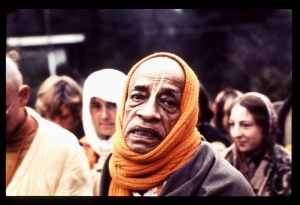SB 6.18.66-67: Difference between revisions
m (1 revision(s)) |
(Vanibot #0054 edit - transform synonyms into clickable links, which search similar occurrences) |
||
| (One intermediate revision by one other user not shown) | |||
| Line 1: | Line 1: | ||
{{info | {{info | ||
|speaker= | |speaker=Śukadeva Gosvāmī | ||
|listener=King | |listener=King Parīkṣit | ||
}} | }} | ||
[[Category:Srimad-Bhagavatam - Canto 06 Chapter 18]] | |||
[[Category:Bhagavatam Verses Spoken by Sukadeva Gosvami - Vanisource|061866]] | |||
<div style="float:left">'''[[Srimad-Bhagavatam]] - [[SB 6|Sixth Canto]] - [[SB 6.18: Diti Vows to Kill King Indra|Chapter 18: Diti Vows to Kill King Indra]]'''</div> | |||
<div style="float:right">[[File:Go-previous.png|link=SB 6.18.65]] '''[[SB 6.18.65]] - [[SB 6.18.68]]''' [[File:Go-next.png|link=SB 6.18.68]]</div> | |||
{{RandomImage}} | |||
==== TEXTS 66-67 ==== | ==== TEXTS 66-67 ==== | ||
<div class="verse"> | |||
:sakṛd iṣṭvādi-puruṣaṁ | |||
:puruṣo yāti sāmyatām | |||
:saṁvatsaraṁ kiñcid ūnaṁ | |||
:dityā yad dharir arcitaḥ | |||
:sajūr indreṇa pañcāśad | |||
:devās te maruto 'bhavan | |||
:vyapohya mātṛ-doṣaṁ te | |||
:hariṇā soma-pāḥ kṛtāḥ | |||
sajūr indreṇa pañcāśad | |||
devās te maruto 'bhavan | |||
vyapohya mātṛ-doṣaṁ te | |||
hariṇā soma-pāḥ kṛtāḥ | |||
</div> | </div> | ||
| Line 21: | Line 27: | ||
==== SYNONYMS ==== | ==== SYNONYMS ==== | ||
<div class="synonyms"> | |||
<div | ''[//vanipedia.org/wiki/Special:VaniSearch?s=sakṛt&tab=syno_o&ds=1 sakṛt]'' — once; ''[//vanipedia.org/wiki/Special:VaniSearch?s=iṣṭvā&tab=syno_o&ds=1 iṣṭvā]'' — worshiping; ''[//vanipedia.org/wiki/Special:VaniSearch?s=ādi&tab=syno_o&ds=1 ādi]-[//vanipedia.org/wiki/Special:VaniSearch?s=puruṣam&tab=syno_o&ds=1 puruṣam]'' — the original person; ''[//vanipedia.org/wiki/Special:VaniSearch?s=puruṣaḥ&tab=syno_o&ds=1 puruṣaḥ]'' — a person; ''[//vanipedia.org/wiki/Special:VaniSearch?s=yāti&tab=syno_o&ds=1 yāti]'' — goes to; ''[//vanipedia.org/wiki/Special:VaniSearch?s=sāmyatām&tab=syno_o&ds=1 sāmyatām]'' — possessing the same bodily feature as the Lord; ''[//vanipedia.org/wiki/Special:VaniSearch?s=saṁvatsaram&tab=syno_o&ds=1 saṁvatsaram]'' — a year; ''[//vanipedia.org/wiki/Special:VaniSearch?s=kiñcit&tab=syno_o&ds=1 kiñcit] [//vanipedia.org/wiki/Special:VaniSearch?s=ūnam&tab=syno_o&ds=1 ūnam]'' — a little less than; ''[//vanipedia.org/wiki/Special:VaniSearch?s=dityā&tab=syno_o&ds=1 dityā]'' — by Diti; ''[//vanipedia.org/wiki/Special:VaniSearch?s=yat&tab=syno_o&ds=1 yat]'' — because; ''[//vanipedia.org/wiki/Special:VaniSearch?s=hariḥ&tab=syno_o&ds=1 hariḥ]'' — Lord Hari; ''[//vanipedia.org/wiki/Special:VaniSearch?s=arcitaḥ&tab=syno_o&ds=1 arcitaḥ]'' — was worshiped; ''[//vanipedia.org/wiki/Special:VaniSearch?s=sajūḥ&tab=syno_o&ds=1 sajūḥ]'' — with; ''[//vanipedia.org/wiki/Special:VaniSearch?s=indreṇa&tab=syno_o&ds=1 indreṇa]'' — Indra; ''[//vanipedia.org/wiki/Special:VaniSearch?s=pañcāśat&tab=syno_o&ds=1 pañcāśat]'' — fifty; ''[//vanipedia.org/wiki/Special:VaniSearch?s=devāḥ&tab=syno_o&ds=1 devāḥ]'' — demigods; ''[//vanipedia.org/wiki/Special:VaniSearch?s=te&tab=syno_o&ds=1 te]'' — they; ''[//vanipedia.org/wiki/Special:VaniSearch?s=marutaḥ&tab=syno_o&ds=1 marutaḥ]'' — the Maruts; ''[//vanipedia.org/wiki/Special:VaniSearch?s=abhavan&tab=syno_o&ds=1 abhavan]'' — became; ''[//vanipedia.org/wiki/Special:VaniSearch?s=vyapohya&tab=syno_o&ds=1 vyapohya]'' — removing; ''[//vanipedia.org/wiki/Special:VaniSearch?s=mātṛ&tab=syno_o&ds=1 mātṛ]-[//vanipedia.org/wiki/Special:VaniSearch?s=doṣam&tab=syno_o&ds=1 doṣam]'' — the fault of their mother; ''[//vanipedia.org/wiki/Special:VaniSearch?s=te&tab=syno_o&ds=1 te]'' — they; ''[//vanipedia.org/wiki/Special:VaniSearch?s=hariṇā&tab=syno_o&ds=1 hariṇā]'' — by Lord Hari; ''[//vanipedia.org/wiki/Special:VaniSearch?s=soma&tab=syno_o&ds=1 soma]-[//vanipedia.org/wiki/Special:VaniSearch?s=pāḥ&tab=syno_o&ds=1 pāḥ]'' — drinkers of ''soma-rasa''; ''[//vanipedia.org/wiki/Special:VaniSearch?s=kṛtāḥ&tab=syno_o&ds=1 kṛtāḥ]'' — were made. | ||
</div> | </div> | ||
| Line 29: | Line 34: | ||
==== TRANSLATION ==== | ==== TRANSLATION ==== | ||
<div class="translation"> | |||
<div | |||
If one worships the Supreme Personality of Godhead, the original person, even once, he receives the benefit of being promoted to the spiritual world and possessing the same bodily features as Viṣṇu. Diti worshiped Lord Viṣṇu for almost one year, adhering to a great vow. Because of such strength in spiritual life, the forty-nine Maruts were born. How, then, is it wonderful that the Maruts, although born from the womb of Diti, became equal to the demigods by the mercy of the Supreme Lord ? | If one worships the Supreme Personality of Godhead, the original person, even once, he receives the benefit of being promoted to the spiritual world and possessing the same bodily features as Viṣṇu. Diti worshiped Lord Viṣṇu for almost one year, adhering to a great vow. Because of such strength in spiritual life, the forty-nine Maruts were born. How, then, is it wonderful that the Maruts, although born from the womb of Diti, became equal to the demigods by the mercy of the Supreme Lord ? | ||
</div> | </div> | ||
__NOTOC__ | |||
<div style="float:right; clear:both;">[[File:Go-previous.png|link=SB 6.18.65]] '''[[SB 6.18.65]] - [[SB 6.18.68]]''' [[File:Go-next.png|link=SB 6.18.68]]</div> | |||
__NOTOC__ | |||
__NOEDITSECTION__ | |||
Latest revision as of 22:36, 18 February 2024

A.C. Bhaktivedanta Swami Prabhupada
TEXTS 66-67
- sakṛd iṣṭvādi-puruṣaṁ
- puruṣo yāti sāmyatām
- saṁvatsaraṁ kiñcid ūnaṁ
- dityā yad dharir arcitaḥ
- sajūr indreṇa pañcāśad
- devās te maruto 'bhavan
- vyapohya mātṛ-doṣaṁ te
- hariṇā soma-pāḥ kṛtāḥ
SYNONYMS
sakṛt — once; iṣṭvā — worshiping; ādi-puruṣam — the original person; puruṣaḥ — a person; yāti — goes to; sāmyatām — possessing the same bodily feature as the Lord; saṁvatsaram — a year; kiñcit ūnam — a little less than; dityā — by Diti; yat — because; hariḥ — Lord Hari; arcitaḥ — was worshiped; sajūḥ — with; indreṇa — Indra; pañcāśat — fifty; devāḥ — demigods; te — they; marutaḥ — the Maruts; abhavan — became; vyapohya — removing; mātṛ-doṣam — the fault of their mother; te — they; hariṇā — by Lord Hari; soma-pāḥ — drinkers of soma-rasa; kṛtāḥ — were made.
TRANSLATION
If one worships the Supreme Personality of Godhead, the original person, even once, he receives the benefit of being promoted to the spiritual world and possessing the same bodily features as Viṣṇu. Diti worshiped Lord Viṣṇu for almost one year, adhering to a great vow. Because of such strength in spiritual life, the forty-nine Maruts were born. How, then, is it wonderful that the Maruts, although born from the womb of Diti, became equal to the demigods by the mercy of the Supreme Lord ?